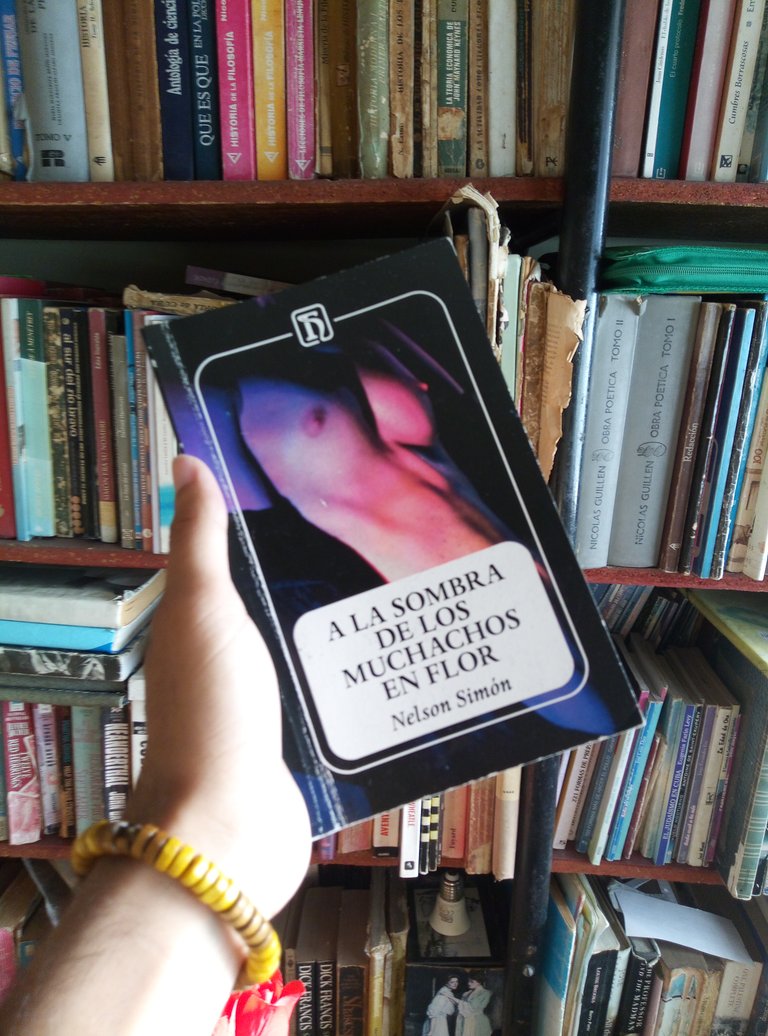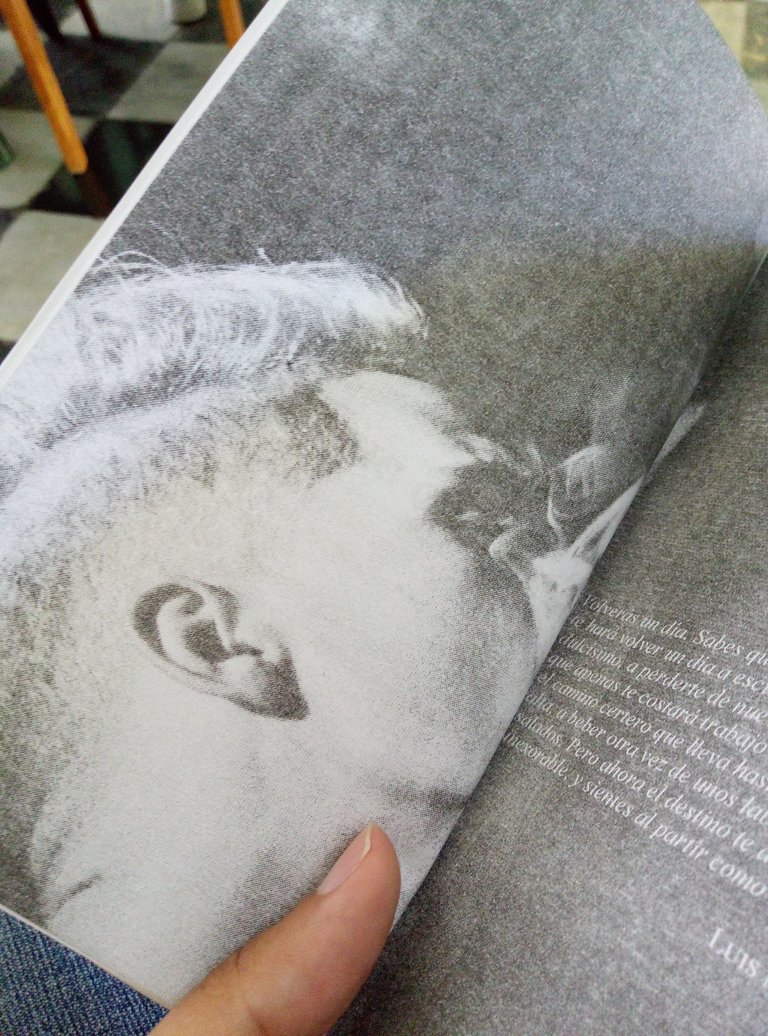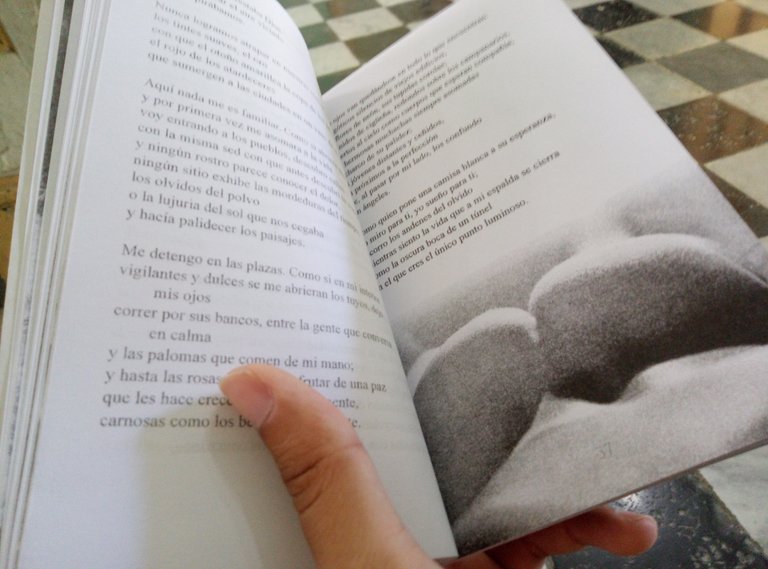Eroticism and exploration: the magic of sincerity [eng-esp]

Since I found out that this book would be presented at this year's fair, I couldn't contain my excitement. It really wasn't for less. A la sombra de los muchachos en flor was a book that broke schemes from the moment of its publication, and not for nothing the following year it won the prize awarded by the Union of Writers and Artists of Cuba (UNEAC according to its acronym in Spanish). The century was just beginning and homosexuality was beginning to have a place in society, after atrocious years of repression.
Just at the moment when Nelson Simón could have rabidly released everything that was previously better hidden, he decided to communicate it in an idyllic way, knowing how to break (gently) previously imposed barriers. Therefore, this book of poems becomes something suitable for all types of readers, as it serves as a mirror for introspection.

The first part of the book, Itinerary of Oblivion, is perhaps the saddest and most heartbreaking. The author must leave for another land and distress is imminent. He opens the book by saying, * "This is the last day that I resigned burial / in the barren soil of an island/ to which I remain bound forever."* With that we already have the premonition of everything that is to come.
Nelson is saying goodbye to everything he knows so far, and although his soul asks him otherwise, he knows that there is no turning back. Thus, this poet undertakes two journeys: the first is the physical journey, which includes his departure to Europe and ends with the return to the island; and then there is the journey to the interior, where he understands and assimilates his true nature in each environment through which he transits.

In the second part of the book, although the nostalgic intensity does not wane, we can assume other nuances. Here we notice the man who understands the transience of his adventures that, although memorable, only serve to enjoy the moment. He craves the flesh of young people who enter the flower of youth, tries to drink and catch that elusive magic, and envies them because their years no longer return, their body ages and he fears loneliness.
It is right here that the book's greatest achievements come, showing that both classical and contemporary structures are perfectly molded when you have something good to say. Poems like these are not achieved with the beauty of the image alone." It was necessary to embark on a path that from the beginning plagues in an overwhelming way; however, those who persist manage to accept the "I" that suffers, that dreams, that has sex without any inhibition and that, in short, lives and loves. One only comes out of this path with a stronger and more complete perception of oneself and that is the greatest achievement of the one who wrote it and of the one who manages to incarnate while reading.
I think this book is a necessary book, as Nelson proves that men can also be in the shadow of blooming boys.
Finally, I want to share poem Six from the first part of the book (and my favorite, to tell the truth).
I had nothing, only promises and a lover,
just a man's body to say— - in the summer
of the ruddy afternoons—, "when I lay on him
I feel like I can touch the fleeting edges of happiness."
I had no home, no heaven, no freedom,
no more dove on or sick in front
that her dark kiss, no more root than her sex
sinking into my flesh, fixing me to the earth,
feeding me.
I had nothing but his words, musical words
that he would leave in his wake and pick like wild strawberries,
stains, howls I kept on white papers
to set my course for false glory.
I had nothing, not even the certainty of being alive.
If I had any life, I lived it in the little deaths
that he gave me.
I hope you liked this post. All photos used are my property. Until next time!

Erotismo y exploración: la magia de la sinceridad.
Versión en Español

Desde que me enteré que en la feria de este año se presentaría este libro, no pude contener mi emoción. Realmente no era para menos. A la sombra de los muchachos en flor fue un libro que rompió esquemas desde el momento de su publicación, y no en vano al año siguiente ganó el premio que otorga la Unión de Escritores y Artistas de Cuba (UNEAC según sus siglas en español). Recién iniciaba el siglo y la homosexualidad comenzaba a tener espacio en la sociedad, tras años atroces de represión.
Justo en el momento en el que Nelson Simón podía haber soltado rabiosamente todo lo que antes era mejor ocultar, decidió comunicarlo de una manera idílica, sabiendo romper (con delicadeza) barreras anteriormente impuestas. Por tanto, este poemario se vuelve algo idóneo para todo tipo de lector, ya que sirve como espejo para la introspección.

La primera parte del libro, Itinerario del olvido, es quizás la más triste y desgarradora. El autor debe partir hacia otra tierra y la angustia es inminente. Abre el libro diciendo, "Este es el último día que resignado entierro/en el estéril suelo de una isla/a la que quedo atado para siempre". Con eso ya tenemos la premonición de todo lo que está por venir.
Nelson se está despidiendo de todo lo que hasta ahora conoce, y aunque su alma le pide lo contrario, sabe que no hay marcha atrás. Así, este poeta emprende dos viajes: el primero es el viaje físico, que comprende su salida hacia Europa y termina con el regreso a la isla; y luego está el viaje al interior, donde comprende y asimila su verdadera naturaleza en cada entorno por el que transita.

En la segunda parte del libro, aunque la intensidad nostálgica no decae, podemos asumir otros matices. Aquí notamos al hombre que entiende la fugacidad de sus aventuras que, aunque memorables, solo sirven para disfrutar el momento. Ansía la carne de los jóvenes que entran en la flor de la juventud, trata de beber y atrapar esa magia escurridiza, y los envidia porque ya sus años no regresan, su cuerpo envejece y teme a la soledad.
Es justo aquí donde llegan los mayores logros del libro, mostrando que tanto estructuras clásicas como contemporáneas se moldean perfectamente cuando se tiene algo bueno que decir. Poemas como estos no se logran solo con a belleza de la imagen". Era necesario emprender un camino que desde un principio azota de manera abrumadora; sin embargo quien persiste logra aceptar al "yo" que sufre, que sueña, que tiene sexo sin ningún tipo de inhibición y que, en fin, vive y ama. De este camino solo se sale con una percepción de uno mismo más fuerte y completa y he ahí el mayor logro de quien lo escribió y de quien logra encarnar mientras lee.
Creo que este libro es un libro necesario, ya que Nelson demuestra que los hombres también pueden estar a la sombra de los muchachos en flor.
Para finalizar, quiero compartir el poema Seis de la primera parte del libro (y mi favorito, a decir verdad).
Yo no tenía nada, solo promesas y un amante,
solo el cuerpo de un hombre para decir, —en el estío
de las rojizas tardes—, "cuando me tiendo sobre él
siento que puedo tocar los fugaces bordes de la felicidad".
Yo no tenía casa, ni cielo, ni libertad,
ni más paloma sobre ni enferma frente
que su beso oscuro, ni más raíz que su sexo
hundiéndose en mi carne, fijándome a la tierra,
alimentándome.
Yo no tenía más que sus palabras, musicales palabras
que él dejaba a su paso y que recogía como fresas silvestres,
manchas, aullidos que guardaba sobre blancos papeles
para marcar mi rumbo hacia la falsa gloria.
Yo no tenía nada, ni siquiera la certeza de estar vivo.
Si alguna vida tuve, la viví en las pequeñas muertes
que él me daba.
Espero que este post les haya gustado. Todas las fotos usadas son de mi propiedad. ¡Hasta la próxima!

Excelente análisis. Te felicito 👏🏻👏🏻👏🏻👏🏻
Gracias ☺️
Sending Love and Ecency Curation Vote!
 Please Vote for our New Proposal! 🙏
Please Vote for our New Proposal! 🙏
Thank you! 💙
¡Qué bien por ti!
Gracias 😄
!DIY
Thank you! 🙏🏼❣️
Te he visto profundamente emocionado con este libro. Nelson es un gran autor. Me alegro que te haya tocado.
Antes había leído otros libros con temáticas similares, pero ninguno con este grado de madurez. La espera y la emoción no fueron en vano 😁.
I love the way you laid it out bare,explained it and I am intrigued...I want to read more
I couldn't help it, it has become my favorite book this year so far. I think it's going to be hard to have an English version of it, but hope it happens some day. This author deserves a bigger public.
Excelente texto que invita a leer esa obra. Se nota tu sensibilidad en cada palabra. Sería una suerte tenerlo y disfrutar de él. 😘🙏👏
Desconozco cuál fue la distribución que tuvo el libro en esta feria, pero espero que puedas leerlo algún día 🙏🏼.
Gracias 😘🙏
Por suerte los tabúes (algunos de ellos al menos) han ido desapareciendo poco a poco del panorama literario cubano, es que el puritanismo nunca fue buena compañía para un viaje tan largo como la vida. Realmente no conocía al autor ni su obra, gracias por tu reseña.
Gracias a tí por detenerte a leer. Saludos ☺️.
Congratulations @claudiocruz! You received a personal badge!
Wait until the end of Power Up Day to find out the size of your Power-Bee.
May the Hive Power be with you!
You can view your badges on your board and compare yourself to others in the Ranking
Check out our last posts:
Your review captures the depth and emotional weight of A la sombra de los muchachos en flor so beautifully.
I love how you highlight the dual journey both physical and internal, making the poetry feel even more profound.
That excerpt from Poem Six? Absolutely haunting and gorgeous. Now I need to read this book!"
Thank you! I feel attached to this book so I couldn't describe it better 😂. By now there are not english translations of it, I guess, but I hope there's one some day. Thanks for this heartfelt comment! ❣️
I hope there's one some day too
You are welcome
Esta publicación ha recibido el voto de Literatos, la comunidad de literatura en español en Hive y ha sido compartido en el blog de nuestra cuenta.
¿Quieres contribuir a engrandecer este proyecto? ¡Haz clic aquí y entérate cómo!
¡Gracias por la curación!
I have not read that collection of poems, but from the way you describe it, it is a book with a lot of weight and feeling. I am impressed by what you say about how it broke the mold in Cuba by dealing with the subject of homosexuality in such a particular way, as you say, “idyllic” but direct, just at the beginning of the century. Good contribution!